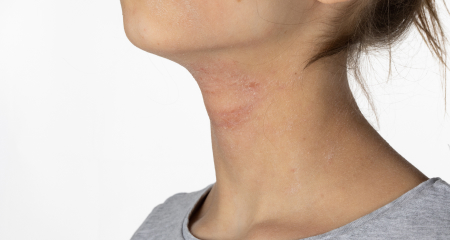
Hives, also known as urticaria, is a common inflammatory condition in North Richland Hills that can present as pink to red whelps anywhere on the skin. Symptoms include inflammation, itching, and swelling of the skin. People may also experience swelling around the eyes or swelling of the lips. In rare severe cases, some patients may experience difficulty breathing due to swelling of the throat and airway. As with most inflammatory conditions, urticaria is due to an over-activation of the immune system. This can be either due to an allergic reaction which stimulates the immune response or an intrinsic problem with a gradual onset.
Urticaria, commonly known as hives, is a frequent inflammatory skin condition that appears as pinkish to reddish welts on the skin. Swelling around the eyes or lips is also common, and in severe cases, airway and throat swelling (anaphylaxis) may occur, requiring emergency medical attention. Hives are caused by increased immune system activity, where certain immune cells release histamine and other chemicals. Triggers may include allergic reactions or sensitivity to external factors, but in most cases, the exact cause is unknown.
Hives are categorized as either “acute urticaria” or “chronic urticaria” based on how long they last. Acute urticaria generally resolves within six weeks and is often associated with allergies. A variety of allergens, medications, infections, and environmental factors can trigger acute hives. In contrast, chronic urticaria persists for more than six weeks, and its cause is frequently unknown, often classified as idiopathic. This persistent form of hives can be challenging to treat.
The list of possible causes for hives is vast, making it occasionally tough to identify the exact trigger. And again, in over 50% of cases the cause is unknown. There are some distinct subtypes of chronic hives (chronic inducible urticaria):
• Heat urticaria
• Cold urticaria
• Cholinergic urticaria
• Solar urticaria
• Contact urticaria
• Delayed pressure urticaria
• Vibratory urticaria
• Aquagenic urticaria
The primary goal of treatment is to reduce itching and prevent hives from returning. Keeping a journal of potential triggers can help identify any causes, and avoiding known triggers is key.
The main medical treatment for hives involves oral antihistamines, which are often available over-the-counter. These include non-sedating options such as loratadine (Claritin), cetirizine (Zyrtec), and fexofenadine (Allegra), as well as the more sedating diphenhydramine (Benadryl). Prescription options like hydroxyzine (Atarax) and desloratadine (Clarinex) may also be used.
Topical anti-itch creams, such as over-the-counter lotions with pramoxine, calamine, or menthol, can temporarily ease symptoms. A topical steroid cream, lotion, or ointment may be prescribed, and oral steroids may be used short-term if hives are widespread.
Managing chronic urticaria can be complex and may require varied approaches. If antihistamines and topical treatments are not effective, immunosuppressant therapy may be considered to reduce the immune response, sometimes involving referral to an allergist.
If hives are accompanied by symptoms like lip swelling, difficulty swallowing or breathing, lightheadedness, or a racing heartbeat, it is essential to seek emergency care promptly.
